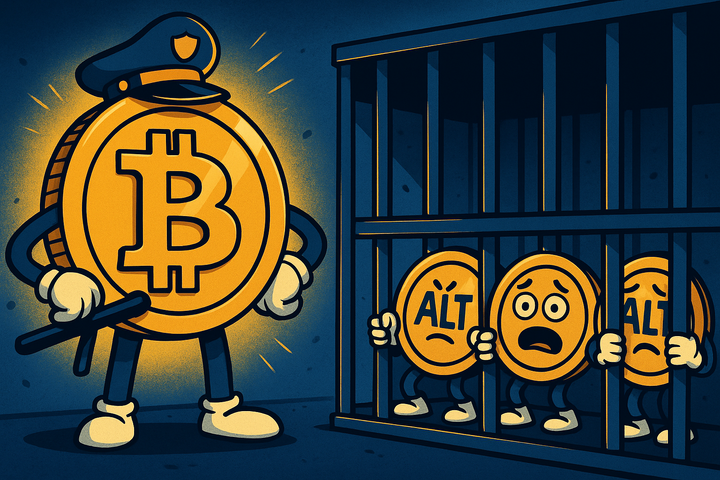Unlocking Bitcoin’s Next Bull Run: The Role of Bitcoin ETF Options
In the September 27, 2024 episode of Unchained, host Laura Shin interviews Joshua Lim about the recent developments in Bitcoin ETF options, focusing on how this could potentially unlock the next Bitcoin bull run.

Briefing Notes
My 'briefing notes' summarize the content of podcast episodes; they do not reflect my own views. If you have comments about this briefing note, please leave a comment below (requires signing up for a free blog subscription). Note that some of the podcast episodes I summarize may be sponsored: don't trust, verify, if the information you are looking for is to be used for decision-making.
Summary
In the September 27, 2024 episode of Unchained, Laura Shin interviews Joshua Lim to discuss the recent approval of Bitcoin ETF options and its potential to reshape the Bitcoin market. Lim explains how ETF options could unlock substantial institutional capital, leading to increased liquidity, reduced volatility, and arbitrage opportunities across Bitcoin markets. He highlights the broader implications for altcoins, DeFi, and lending markets, while also noting the regulatory uncertainties that could affect the future of Bitcoin ETF options, especially with the upcoming U.S. election.
Take-Home Messages
- Institutional participation is poised to increase as Bitcoin ETF options provide sophisticated tools for risk management and speculation, appealing to asset managers and hedge funds.
- Volatility in Bitcoin markets may decrease with the issuance of structured products and ETF-backed lending, offering greater price stability over time.
- Arbitrage opportunities will emerge as Bitcoin ETF options introduce price discrepancies between different derivatives, such as futures and options, providing both risks and opportunities for traders.
- Regulatory clarity remains critical to the success of Bitcoin ETF options, with approvals needed from multiple regulatory bodies, including the CFTC and OCC.
- Altcoins may see speculative growth as capital flows into Bitcoin markets, potentially trickling down into riskier, more volatile assets in the crypto ecosystem.
Overview
Joshua Lim delves into the technicalities of Bitcoin ETF options, explaining how they differ from other derivatives like futures. He emphasizes that ETF options, now approved by the SEC, represent a significant step forward for institutional adoption of Bitcoin. ETF options offer more sophisticated tools for managing risk and engaging in speculative trading, appealing to institutional players such as hedge funds, asset managers, and proprietary trading firms.
Lim also discusses the broader market impact of ETF options. He explains that structured financial products, such as those bundling options with bonds, could help stabilize Bitcoin’s price by reducing volatility. Additionally, ETF-backed lending could unlock liquidity in both retail and institutional markets, creating new opportunities for traders to access capital. While these developments are likely to boost Bitcoin liquidity, Lim points out that arbitrage opportunities between different Bitcoin derivatives could lead to short-term price swings.
The conversation also touches on the regulatory challenges that lie ahead. Although the SEC has approved BlackRock’s Bitcoin ETF options, additional approvals from the CFTC and OCC are required. Lim warns that regulatory delays could hinder the rollout of these products, particularly in light of the upcoming U.S. presidential election. He predicts that political outcomes could introduce further market volatility depending on the regulatory stance of the winning administration.
Stakeholder Perspectives
- Institutional Investors: Will benefit from the availability of sophisticated trading instruments like ETF options, which allow for more precise hedging and speculation. Increased institutional participation could lead to more stable Bitcoin prices.
- Retail Traders: Could face increased market volatility, particularly in altcoins, as capital flows into the crypto ecosystem. Retail traders should be cautious of speculative bubbles forming in riskier assets.
- Regulators: Will need to ensure that the introduction of Bitcoin ETF options does not introduce systemic risks. Regulatory clarity is critical for ensuring the long-term success of these financial products.
- Crypto-Native Venues (e.g., Deribit): May lose market share to regulated venues, but will likely remain a key platform for traders seeking unregulated, crypto-native options.
Implications
The introduction of Bitcoin ETF options is likely to reshape the financial landscape for Bitcoin, driving significant capital inflows from institutional investors. This could stabilize liquidity in Bitcoin markets, reduce volatility, and create opportunities for arbitrage between different derivatives. However, the broader implications go beyond Bitcoin itself. As institutional capital flows into the ecosystem, altcoins and DeFi could experience speculative growth, leading to increased volatility in these markets. The regulatory landscape will play a crucial role in determining the long-term success of Bitcoin ETF options, particularly as the U.S. presidential election approaches, introducing further uncertainty.
For stakeholders, the key takeaway is that while Bitcoin ETF options offer tremendous opportunities, they also come with risks—both in terms of market volatility and regulatory uncertainty. Market participants will need to stay informed about evolving regulations and capitalize on emerging opportunities while managing potential risks.
Future Outlook
Bitcoin ETF options could unlock significant growth for the broader Bitcoin ecosystem. The availability of these sophisticated financial instruments will likely attract more institutional capital, stabilizing liquidity and reducing volatility. However, the future of Bitcoin ETF options hinges on regulatory approvals and the outcome of the U.S. presidential election. Investors should be prepared for short-term volatility, particularly as market dynamics adjust to the influx of institutional players.
Moreover, the introduction of ETF-backed lending could further enhance market liquidity, allowing institutional and retail traders to access capital more easily. This could lead to long-term price stability in Bitcoin markets, making Bitcoin more attractive to risk-averse institutional investors. However, the capital inflows into altcoins and DeFi could create speculative bubbles, which will need to be carefully monitored.
Information Gaps
- How will regulatory bodies like the CFTC and OCC impact the timeline for Bitcoin ETF options? The launch of Bitcoin ETF options hinges on further regulatory approvals. It is crucial to understand the role these regulatory bodies will play in determining when and how these products will be rolled out.
- How will the influx of institutional capital through ETF options affect Bitcoin’s market liquidity? Understanding the impact of institutional capital on Bitcoin’s liquidity is essential for predicting market stability and price movements. This question addresses how institutional players will change the market dynamic.
- What arbitrage opportunities exist between Bitcoin futures and ETF options markets? Arbitrage opportunities could stabilize or destabilize markets. This question seeks to identify the potential effects of price discrepancies across different Bitcoin derivatives.
- How will the availability of ETF-backed lending products influence the overall liquidity in Bitcoin markets? ETF-backed lending has the potential to unlock significant capital, but the broader implications for liquidity and volatility are still unclear.
- How might increased capital availability in Bitcoin markets, due to ETF options, lead to speculative bubbles in altcoins? Capital flowing into Bitcoin has historically led to speculative growth in altcoins. Understanding this dynamic is key for managing risk in the broader crypto market.
Broader Implications for Bitcoin
Institutionalization of Bitcoin as a Mainstream Asset
The approval of Bitcoin ETF options could accelerate Bitcoin’s transition from a niche investment to a mainstream asset class. This shift may lead traditional financial institutions to increasingly incorporate Bitcoin into portfolios alongside stocks, bonds, and commodities. Over time, Bitcoin could be treated similarly to gold, further solidifying its role as a global store of value.
Shifts in Global Financial Sovereignty and Economic Strategy
Widespread institutional adoption of Bitcoin could lead sovereign wealth funds and even governments to hold Bitcoin as part of their reserves. This shift may influence global financial sovereignty, as Bitcoin offers a hedge against traditional fiat currencies and geopolitical instability. Over time, this could challenge the dominance of the U.S. dollar as a global reserve currency.
Technological Innovation in Financial Products
The development of Bitcoin ETF options reflects how financial products are evolving to incorporate new technologies. These innovations may pave the way for hybrid financial instruments that combine traditional and digital assets. As fintech evolves, we could see deeper integration between decentralized blockchain networks and legacy financial systems.
Societal Shifts Toward Decentralized Financial Systems
As institutional adoption of Bitcoin grows, it could spark greater public interest in decentralized finance (DeFi) and peer-to-peer financial services. The principles of decentralization may become more attractive to those frustrated with traditional banking systems. This cultural shift could push demand for more transparent, self-sovereign financial solutions in the broader economy.



Comments ()